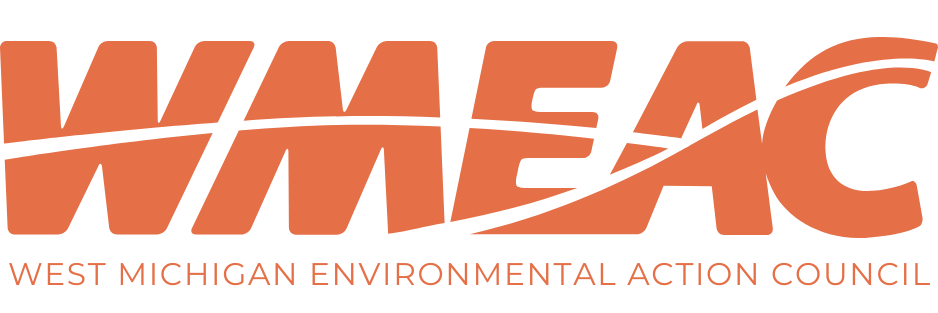By: Mallory Meston, WMEAC’s Lakeshore Fellow
Q: Please introduce yourself, Mike, tell us who you are and what you do…
A: My name is Michael Eslick. I am the Operations Manager for Public Health [Muskegon County]. One of my main duties is to oversee the Environmental Health (EH) Programs. There are more than 20 programs in EH including Onsite Waste Residential/Commercial permitting for septic systems. Public Health is responsible for the permitting, enforcement, environmental protection, and record-keeping of all residents who have their own septic treatment systems.
Q: Why is proper maintenance of septic systems important?
A: Simple operation and maintenance for a home septic system will help ensure that the system will last longer and perform optimally. Found within each home’s septic system is an actual living and breathing component, bacteria. These colonies of bacteria are responsible for the breaking down of organic matter found in sewage. Just like you and me, bacteria have preferential living conditions. When conditions are not optimized, bacteria activity decreases which directly correlates to the treatment of sewage. This is why the permitting process is so important. Trained staff from Public Health ensure that installed systems are constructed to provide treatment, not just disposal. Treatment is where the bacteria have the correct amount of space and oxygen to function at the maximum.
Q: What specific things do homeowners need to know to properly maintain their septic system?
A: Understanding what should or should not go down the toilet or drain is essential. Plus, having scheduled maintenance for the system itself will extend a system’s years of service. Homeowners who have a septic system need to know that there are steps to take when caring for their septic system. Septic treatment systems are not indestructible and can be very costly when replacement is needed. Most repairs and all replacements to a system require a permit from Public Health. To reach the Environmental Health division of Public Health call 231.724.6208 or email: PublicHealth.EnviromentalHealth@co.muskegon.mi.us.
The “to-do list” for effectively maintaining and operating a sewage system is broken into two parts, in my opinion: inside the house and outside of the house. Inside the home, a homeowner should always fix a leaking fixture as soon as possible. One leaking faucet that drips 8 ounces every 10 minutes will use 3,285 gallons/year. An average leaking toilet can lose 200 gallons/day which adds up to 73,000 gallons a year. One must remember, this wasted water is going into the septic system. Most likely, the system was not designed to treat that much wastewater and premature failure is imminent. Household chemicals, if overused, can cause widespread bacterial death, affecting the treatment rate and effectiveness of one’s sewage system. Dumping unused prescriptions into a system could also present contamination issues. Sanitary wipes, whether rated for septic systems or not, can cause clogging in the home’s plumbing and within the drain field’s plumbing. The general rule is if it is not human waste or toilet paper, it should not go down the pipe. Lastly, within the home, scheduling water use is the best practice. If there are quite a few people in the home, ask some to shower at different times of the day, stagger laundry loads throughout the week, and don’t use the garbage disposal if possible. It is much easier on a septic system when unprocessed food does not go down the drain.
Q: What specific things do homeowners need to do to properly maintain their septic system?
A: Maintaining your septic system is essential to increasing the lifespan of your system. Anyone can do a quick check of your septic system. Below are items to check:
- Overgrowth over the drain field or near the septic tank. There should not be any trees, shrubs, or deep-rooted fibrous plants living on or near the drain field. Seek professional advice before removing shrubs and trees (removing them if they are established could damage the drain field).
- No parking or driving over the drain field.
- The septic tank should be emptied every 3 – 5 years. Please note that other factors can influence that recommendation. For example, if more people (especially adults) move into the home and/or home use changes (rental or Airbnb).
- Know the age of your septic system (90% of failures in Muskegon County take place after 20+ years). If your system is over 20+ years, be more alert and attentive
- Check to see if you smell sewage after high-use times (laundry or morning showers.)
- Check to see if sewage is bubbling to the surface.
- When the septage hauler is emptying the tank, check to see if sewage flows back into the tank from the drain field (most likely the drain field has failed if this happens).
- Are the household drains emptying slowly? If so, check for pipe blockage, a full tank, or drain field failure.
- Conduct a septic tank inspection:
- Find and open the lid (located on the end of the tank (outlet side).
- Was the lid functioning correctly?
- Is the baffle intact? (Some of the older cement baffles will disintegrate.)
- Does your baffle have a filter inside it? If so, remove the filter and spray with the hose nozzle to clean. Replace the filter when completed.
- Is the tank watertight? The sewage line should not be more than 3 or 4 inches from the outlet pipe.
- If your tank is 2/3 or less full, call a contractor and contact your local health department. There is a good chance the tank is leaking.
- Inspect the tank for root inundation. There should not be any roots inside the tank.
- Check for cracks.
- Know where your system is located on your property. Please note, the Health Department has a copy of your records if needed.
- Most homeowners with a septic system have what is called a reserve area. This reserve area is an area designated when the permit was issued by the Health Department. It is an area set aside to be used when the current drain field fails. The homeowner should know and understand that this space should not be built upon or covered by a driveway or parking
- If you bought a home recently, make sure that there isn’t a building structure built over the tank or drain field. It isn’t uncommon for a deck to be built over a septic system. Sunlight and proper airflow are important factors in the design of a septic system. The proper amount of drying of the soil within a system is important for the saturation and movement of water molecules.
- Public Health Muskegon County also offers well and septic evaluations if you are considering buying or selling your home. Check our website for an application. If you have any questions concerning how your system works, please give us a call, we are happy to help.
Q: Is there any other advice you have for homeowners with septic systems?
A: Be proactive and don’t be caught off guard while you and your family are celebrating during the holidays and the septic system backs up and toilets can’t be flushed. Been there and done that! Not fun. Instead, check your system at least once a year and keep up with common operations and maintenance. If you notice that your drains are not emptying at their normal speed, and you hear gurgling, call someone and use the hints provided. A good place to start is to call a professional.
Funding for this project was provided by the Michigan Coastal Management Program, Water Resources Division, Department of Environment, Great Lakes, and Energy, and the National Oceanic and Atmospheric Administration.


